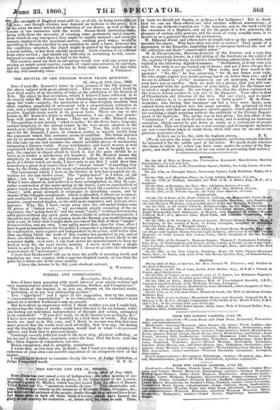THE REVIVAL OF THE ENGLISH WATCH TRADE QUEVTION. 67, Strand,
14th June, 1860. SIR—I read Mr. Bennett's letter in your journal of the 9th instant on the above subject with great satisfaction. That letter was called forth by your kind notice of an invention of mine at the exhibition of the Society of Arts. My object in that invention, which I believe I have achieved, is to do exactly what Mr. Bennett has been labouring so many years to impress
upon the trade—namely, the production of a time-keeping machine that shall combine simplicity of movement with a proportionate reduction in cost, and a solidity and accuracy equal to that now obtained from the ex- pensive English-made watch in its present form. There are one or two points in Mr. Bennett'a letter to which, however, I am sure' that gentle- Emu will pardon me, if I demur. They are these :—Mr. Bennett says, "The question is not merely what to make,' for tlie Swiss have, long ago, carried simplicity to the utmost extent by the very means adopted in the watch now exhibiting at the Society of Arts." Now, Sir, with every re- spect for Mr. Bennett, I must, in common justice to myself, totally deny the argument which this sentence seems to establish. The Swiss watches are by no means simple in construction. If any person doubts what I say, let him take up one and examine the almost invisible pieces of mechanism composing a Geneva watch. Every watchmaker, and watch wearer, is well acquainted with their extreme delicacy ; besides, if one is brought to re- pair, the repairer is almost afraid to touch it, lest the parts should be so worn as to render a satisfactory job hopeless. If Mr. Bennett means the simplicity to consist in the easy division of labour by which the several parts of a Swiss watch are made, I have only to say that I could show him something a great deal nearer than the "utmost extent" of anything ever done by the Swiss, either in the mode of manufacture or in the watch itself.
instrument nstrument which I have at the Society of Arts has occupied my at-
tention for the last twelve years. The "going-barrel" is, I know, an old affair but my "going-barrel" has never yet been before the public. Wheel have aimed at, and believed to have accomplished, is, that by a pe- culiar construction of the main-spring in the barrel, I get an equalization of power (such as has hitherto been only obtained from the cumbrous fusee and chain) ; with great strength of resistance to disturbing causes, and by means of the triangle escapement, which is detached, I obtain an accuracy, and continuity of accuracy hitherto impossible from anything but the ex- pensive, compensated duplex, or the still more expensive and delicate chro- nometer. Why, Sir, I -have swept away into the old metal-basket some 22 pieces of "rotten work '- " my movement simply consisting of the es- capement, the "going-barrel," and the usual " train, ' working between two solid plates without any extra parts always liable to serious derangement, I should be very glad, Sir, if, on passing down the Strand, you would favour me with a call, in order that I might show you one of the best of these " simple " Swiss ;watches, and my own. I can safely assert that, class for class, after I have begun to manufacture for the public, I can produce a timekeeper, stronger in conatruction, more regular and independent in its action, with better time than anything which the trade of this country has produced as yet, and at least, one-third cheaper. As a proof that my invention is not likely to die a natural death, even now, I can book orders for manufacturers to keep me hard at work for the next twelve months. I never need make a single watch to bell to the public in my shop, if I choose to go into the wholesale manufacture of "movements."
I trust that Clerkenwell will see in time the poliay of arousing itself, and supplying our own country with a superior English watch, at less than the pnce for a Swiss one of the same quality. I have the honour to be, Sir, your obedient servant, A. WATKINS.


























 Previous page
Previous page